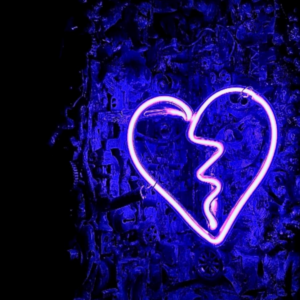TW: Themes of death.
When you moved to Arizona, you thought it meant you would never have to splash through another ankle-deep puddle in your life. You thought it meant blue skies and warm days year-round. But after the week you’ve had, it doesn’t really surprise you that muddy water soaks the fabric of your socks as soon as you get out of his car.
His car. Not your car. Not ever.
You don’t have the energy to be properly offended by the untimely and uncharacteristic flooding of the desert, not when there are so many more important things to properly offend you, so you just slam the car door to release a little bit of your fury, lock it with a small, sad honk, and navigate your way through the small lake that has formed in your corner of the Walmart parking lot.
Waiting just inside the automatic glass doors, there’s a familiar figure in a blue vest lingering next to the hand baskets. He looks up as you approach, and you have to remind yourself not to meet his dark eyes.
“Good morning, Cynthia,” he says, just loud enough for you to hear, and there’s an undertone to it that’s almost wistful.
“Oh, um, morning, Oliver.” Your tongue fumbles the words.
Seventeen-year-old Cynthia is laughing in her grave, wherever you left her. She was always better at talking to Oliver. He used to like talking to you. Maybe even, you thought, he used to like you. Now you can’t imagine being anything more than a shadow.
“Need help finding anything?” he asks, sounding like he hopes you forgot the whole layout of the store, and how to walk on top of that.
“No, I’m good. Thanks.” You take one of the baskets and start off without looking back at him.
It’s a quick trip through the store. It always is. You grab the same things you grab every Monday morning: a loaf of bread, a jar of peanut butter, a box of protein bars, a case of Dr. Pepper, an ocean-scented candle, baby wipes, Chapstick, and whatever book your eyes land on first.
You check out just as quickly, and slip past Oliver while he’s talking to an elderly couple.
It takes you three tries to light the candle. For some reason, the wick doesn’t want to catch. But it finally flares, a small flame the size of your pinky fingernail, and you replace the burnt-out candle on your brother’s bedside table.
You take all the food out of the Walmart bags and stash it on the floor next to the maroon couch that is the lone, desperate pop of color in this otherwise albino room, and then you take out the baby wipes and Chapstick.
With one wipe, you clean both of his hands, setting them carefully back on top of the sheets when you’re finished. With a second wipe, you clean the exposed skin of his face: pale, thin cheeks, a broad scarred forehead, long nose, and two lax, closed eyelids. You rub the Chapstick across his cracked lips, careful not to nudge the tube snaked between them.
“What do you say, Ty?” You don’t bother to whisper. Two years have taught you that it doesn’t matter. “Today a good day to wake up?”
It won’t be. At least, you don’t think so. The doctors gave you the odds a long time ago. The hard numbers. The hard truth. About a five percent chance of waking up with normal brain function.
Tyler doesn’t move. The numbers on the monitors by his bed don’t change. You’ve basically memorized them by now—oxygen levels, pulse, blood pressure, you know the normal range for all of them.
You sigh, drape yourself across the couch (your couch) and stare at the unblemished white of the ceiling. It’s more bearable to look at than the white walls or the white floors or the white sheets on the bed or the white skin stretched over your brother’s bones.
“Have you seen Mom and Dad lately?” you ask. “I mean, have they come to see you? Do you know what they’re talking about? No, they probably wouldn’t tell you.”
You turn the news over in your head, wondering if you should say it out loud, or tell him not to worry. But you need to talk to someone about it, and the odds are Tyler isn’t listening anyway.
“They want to move back. To Oregon. To be by Gran and Grandpa. And they don’t—they don’t want to take you with. They’re talking about . . . giving up, next week. Because it’s your birthday, they said, they think that’s fitting. So if you’re going to wake up, you better stop taking your goddamn time, okay?”
You tear your eyes away from the ceiling to glance at Tyler again. No change.
“Talked to Oliver this morning. Kind of. More like I mumbled. I miss him a lot, but it’s like I forgot how to speak the same language after you. Anyway, he’s still working at Walmart. Still saving up for college, I think.”
You force yourself to sit up just long enough to grab the book you bought before falling back, holding it above your head to see properly. “Got a new book. This one’s a mystery. I can read you one chapter and then I gotta do some work for my classes, okay?”
You sigh, and flip the book open to the first page.
***
There is one empty chair at your dining room table. It’s the one to your right. You’re alone on this side of the scuffed wooden rectangle, and that arrangement constantly funnels the attention of your parents right onto you.
“Have you decided on a major yet?”
“No.”
A fork clatters to a ceramic plate. “Cynthia.”
You don’t raise your eyes from your meal. You don’t want to see your mom or your dad or the dark living room beyond them. It seems the house is always dark these days, with the exception of the golden island surrounding the table. You chase a lone pea around the circumference of your plate. “I don’t know what I want to do. I don’t want to do anything.”
Your dad’s voice when he replies is infuriatingly soft. You want it to be rough, harsh like when you were twelve years old and you kept punching Tyler in the backseat the whole drive from Oregon to Arizona, no matter how many times he told you to stop. “Your brother wouldn’t want you to put your life on hold.”
The pea slips off the edge of your plate, bounces on the wood surface of the kitchen table, and tumbles to the ground. “Please stop saying that.”
“It’s true,” your mom says, and though you still haven’t lifted your gaze you can feel hers on you.
You grit your teeth hard enough to hurt. “No, it’s not. You don’t know what he wants. Maybe he’s scared and alone and needs someone with him, but you’re abandoning him!” As your voice raises your eyes follow, until they’re locked on your mother’s, unflinching, challenging.
Suddenly the wrinkles on her face, her forehead, around her mouth and eyes, seem more pronounced, little ravines opening and opening and threatening to swallow the woman whole.
“Do you think I want to do this? To my child? My baby? Do you think I want to bury him?” Her eyes falter. “Cynthia, we moved out here as a family, for a new adventure. I can’t stay here with this hole in our lives, I . . . we need to go home.”
“It’s been almost two years, Cynthia,” your dad says, as if you haven’t been counting the days. “I know it’s hard, but it’s time to move forward.”
“I can’t move forward, Dad.” Your voice drops to a near-whisper. “Not when it’s my fault he never will.” You push your chair back from the table and retreat down the short hallway to your bedroom.
There is a sadness about your parents that you can’t understand.
No. That’s not true.
There is an acceptance about your parents that you can’t understand.
Your room is not actually your room. It belongs to sixteen-year-old Cynthia, pre-coma Cynthia, Cynthia out of this shadow. The posters on the walls belong to bands whose music is now reduced to echoes in the back of your skull. The books on the shelves are full of stiff words on stiff pages that won’t bend enough to fit in your mind now. The notebooks on the desk are scrawled with lines of poetry meant to capture sorrow written in the pen of a girl who’d never tasted it.
Sitting on top of the comforter on your bed, your laptop is open, displaying an email announcing that the deadline to declare a major is next week.
“Who knew online college could be so demanding?” you whisper, partly to yourself, partly to Tyler. Even though at this distance, he definitely can’t hear you.
You pick up the top notebook off the stack on your desk. The cover is yellow and battered. You vaguely remember carting it with you from class to class sophomore year, hiding it under textbooks on your desk, and scribbling lines when teachers weren’t looking.
You used to fancy yourself profound.
Feeling suffocated by the reminders of a different girl, you turn with the notebook and slip out of your room, moving one door down and closing yourself into Tyler’s.
His room is even more of a time capsule, everything exactly as he left it that day. Clothes slung over his desk chair, books overturned to mark the page, bed unmade, a calculus equation half-written out in his notebook. You remember he was doing homework when you ran in.
On your way to sit on his bed, you accidentally nudge a dusty soccer ball with your foot, and it rolls two feet before coming to a stop against an Xbox controller. Your breath catches and freezes in your throat as you bend and use the very tips of your fingers to roll the ball back into place. You don’t breathe again until you’re firmly situated in the center of his bed.
The first page of the notebook has three lines in black ink, in the flourishing handwriting you used to painstakingly practice until it became natural.
We need the sun, but also rain
To hope for happiness,
We must tolerate pain.
Reading the words feels like looking at pictures of you at fourteen, smiling wide with pink and purple braces. They’re a part of you, and an important one, but if a museum was made in your memory, you’d rather they not make an appearance.
A quick skim through the rest of the occupied pages proves further that you never really did understand what you were writing about.
The last page with words is the page you wrote before running into Tyler’s room that day.
Slipping into the water without a ripple
No butterfly effect to trace back to me
There must be something in all this silence
You flip to the next page, a blank, unblemished page, and you lean over to snag a pen from Tyler’s desk and for a moment you think you might write a poem, but now that you finally understand sorrow, you don’t know if you can bear to name it.
Instead, you try making a list. You write out the title, Things I Could Do With my Life, and you draw the first bullet point.
Then you freeze.
You can’t even think of the first bullet point.
After a minute of staring at that little black dot until it swims in your vision when you blink, you close the notebook. It’s clear you aren’t making any progress.
“Progress,” you whisper to the empty room. “You ever going to make any progress on that calculus problem, Ty?”
***
Later that week, the rain returns with a vengeance, pounding on the roof above your bed all through the night. By morning it slows to a drizzle, gradually building up into the puddles on the sides of the road, small lakes surrounding the bases of cacti.
There are no storm drains in Arizona. Not like you remember back in Oregon. Nowhere for the water to go once it leaps from the clouds. They don’t plan for flooding in the desert.
Tyler left the news on in the car, the last time he drove it, and you haven’t changed the station. He always used to yell at you for touching the controls. As you crawl through the water in the streets, matching the snail’s pace of drivers who don’t know how to handle wet asphalt, a tinny voice flows out of the speakers.
“Roads are closed in the Mesa area, with too much standing water for cars to get through. Officials advise people not to use off-road trails until further notice, as the conditions could cause mudslides. Baseball diamonds across the Phoenix area have also fallen victim to the flooding, and unfortunately, all MLB spring training games scheduled for today have been canceled.”
The rain has this place scurrying into rabbit holes.
You pull into the hospital parking lot, which is, unsurprisingly, flooded. The soles of your sneakers drag through at least an inch of water the whole way to the front door, where an unprecedented number of rugs and wet floor signs populate the lobby. You nod to the man at the front desk.
“Good morning, Josh.”
“Good morning, Cynthia,” he responds with a smile. “Crazy weather, huh? It’s like the end of the world out there.”
You want to roll your eyes. A little rain? But the straps of your backpack are biting into your shoulders and there’s a little clock inside your stomach counting down to Monday (three days) (that’s seventy-two hours) and you don’t really feel like disagreeing. “Yeah, I guess.”
Before you can get any farther into “awkward small talk” territory, you break off from the conversation and start trailing wet footprints down the familiar path to Tyler’s room.
By now, the image of him laid out on that bed, white sheets pulled up to his chest, monitors surrounding him, tubes and wires snaking under the blankets, is so familiar you could draw it from memory. Or you wouldn’t even need memory—it’s practically tattooed inside your eyelids.
You sling your backpack onto one end of the couch. “What do you say, Ty? Is today a good day to wake up?” Perched on the very edge of the couch cushion, you study his face, searching out any little muscle twitch. You let all the air out of your lungs in a stream, pushing a lock of hair off your cheek. “You’re running out of days, you know. You better make up your mind.”
Out of the corner of your eye you notice a vase of flowers on his nightstand, next to your still-burning candle. “Mom come visit you before work?” you ask, standing.
They’re lilies, day lilies, the kind that grew outside your old house in Oregon. You take one yellow petal between your index finger and thumb, slowly rubbing your fingertips against the thick velvet surface.
Do you think I want to bury him?
“Well, anyway, I’m procrastinating on a quiz, and I know you’re on the edge of your seat wanting to know who killed the housekeeper, so get ready to listen to some truly amazing storytelling.” You grab the paperback from the nightstand and tuck yourself into the corner of the couch, legs folded beneath you.
The page you left off on yesterday is dog-eared. You flip to it and smooth your thumb over the corner in an attempt to flatten the paper. It almost works, but there’s a crease there that has an air of permanence.
“Ty?” Suddenly your voice is five years old again, sneaking into Tyler’s room past bedtime to ask one more time what the first day of kindergarten was really like. “When you’re gone, what am I supposed to do?”
It’s the first time you ever say “when” instead of “if.”
***
You throw down your pen. Words aren’t doing anything for you, nothing to dispel the weird, paralyzing feeling that had been settled around your stomach all morning.
You need to get some altitude.
The idea fills you with energy, and it’s all you can do to keep from full-force sprinting into Tyler’s room. You don’t bother to knock, and he turns from his desk, pencil in hand, eyebrows downturned, and you have to act quickly to evade the impending tirade.
“Will you drive me to Hole in the Rock?”
“Will you do my Calculus homework?” he shoots back. “‘Cause if not, I don’t have time.”
You’re not afraid to use the power of the pout on him. “You had time to play Call of Duty for an hour earlier.”
He throws the pencil at you. Luckily, you see it coming, then duck and the graphite tip leaves a gray mark on his doorframe. “Yep. And I used all of that time to play Call of Duty, and now I have none left. This is why you need to get your license.”
“I don’t need my license, I have you.” But Tyler is already turning back to his notebook with a fresh pencil in hand, and you only have a few more moments to catch his attention for good. “Please, Ty, please. I’ll do the dishes for a week!”
With that, the Calculus is quickly abandoned.
The two of you pile into Tyler’s little blue car and take off. You stick your hand out the open window and let it bounce on the warm gusts of desert air.
“Turn on some music,” you whine. “I want to sing!”
“I’m listening to this,” Tyler responds, gesturing with one hand to the speakers. The news station is on, and a woman is talking about the heatwave that’s supposed to hit later in the week. “It might affect the soccer tournament this weekend.”
You roll your eyes at him and hum under your breath for the rest of the ride.
Hole in the Rock is, truthfully, a tourist destination. A big old dusty red rock with a giant hole through the middle is the perfect thing to attract middle-class families from the Midwest, apparently, because every time you go, the place is crawling with them. It’s a really easy hike, so it appeals to a lot of cautious mothers and is therefore a very popular place in Mesa.
The reason you and Tyler like Hole in the Rock so much is that people generally stay away from the very top of the rock, above the hole, and the climb to get there is just challenging enough to be interesting.
You go a little faster than you really need to on the way up, your sneakers finding sure and solid purchase on the stone, just to get to the top before Tyler, and for a moment, you’re alone. The chatter of the soccer moms disappears and it’s just you and an endless stretch of blue sky coming down to meet the mountaintops in the distance. It’s like the whole of the Tonto National Forest is showing off just for you, cacti, and desert brush for miles.
You can breathe.
And then you turn, ready to watch your brother emerge onto the peak with you, and the newfound breath goes right out of your lungs as he takes his last step. His foot slides on a patch of loose pebbles and dust, and before he can make a sound, he disappears backwards down the side of the rock.
“Tyler!”
***
Your body doesn’t want to wake you up Monday morning. Doesn’t want to drag you from blissful ignorance into a world where you have to think and exist.
But you get up anyway.
Today is too important to miss.
You put on a dress, a bright floral one, the kind that you would not wear to a funeral, and you carefully run a brush through your hair until it falls in a thick wavy mass on your shoulders, and you line your eyes with your good eyeliner that always seems to form perfect wings, and you paint your lips red.
It’s the last day you are going to see your brother alive.
In the car, you rely on muscle memory to take you to Walmart, because your mind feels dipped in wet cement and you can’t move your thoughts.
You park his car and it takes you a handful of moments to remember where you are, what you’re supposed to be doing. The only thing your eyes will do is fixate on his steering wheel, unblinking until all the moisture in them evaporates and the burn of it jolts you back into the present.
You almost forget that Oliver exists, until you’re approaching the automatic doors, and your heart sinks a little knowing you probably can’t handle someone noticing you right now. But when you walk into the store, he’s nowhere to be seen.
And somehow, that’s worse.
You go to grab a basket, even though you probably don’t need one, because you really only need one thing this week, but before you can grab the handle, his voice comes breathlessly out of the blue.
“Wait, wait, you don’t need that.”
His cheeks are flushed, his dark hair hanging in his eyes as he jogs towards you. Dangling from one hand is a basket. “I’m sorry, I had this plan, you’re earlier than usual, I was supposed to be here with this when you got here, that was my plan…” His voice trails off and you catch a glimpse of the contents of the basket. An ocean-scented candle. A paperback book. Baby wipes. Chapstick. A loaf of bread. A jar of peanut butter. A box of protein bars. A case of Dr. Pepper.
You look back up at him, meet his eyes.
The corner of his mouth goes up. “I pay attention.”
He tries to hand you the basket, but your hands are shaking. You mean to say thank you, but all that comes out in your tear-shredded voice is “I-I need a birthday cake.”
For a second his face is blank. He blinks at you. “Okay. Okay. Let’s go get you a birthday cake.”
His voice is gentle, and you think he saw the cracks behind your eyes. “So, whose birthday is it?”
Oliver is mostly leading the way, half a step in front of you, and though you can see both his hands clutching the basket, you feel like one of them is gently guiding your back. His question is innocent, but it takes your throat a few moments to clear a path for the answer.
“My brother.”
You expect his eyes to dart away from yours, but instead, they lock on. He knows about Tyler, of course. You told him first, back when it happened. God, you used to talk to him more than anyone.
“I see. You having a party?”
You wonder if you should tell him. Tell him that it’s only half a birthday party and the other half is goodbye forever. But you don’t think you can do that without losing the tight grip you have on the tears behind your eyes. “Sort of.”
He changes the subject, a mercy for you. “You’re taking online classes, right? University of Phoenix?”
You nod, chest tight at the reminder.
“How do you like that? I’ve got a fair amount saved up from the last couple of years, and I’m starting to look at my options.”
The first reaction of your brain is to spew back some blanket statement. Some yeah, it’s okay, or It’s nice to work at my own pace. But Oliver has been dreaming about college for years, you know that, and he’s looking at you so intensely, like whatever comes out of your mouth is going to make his whole decision right on the spot, and you have to give him the truth.
“It’s lonely,” you say. “The classes are fine, but sometimes I wish I’d gone to a traditional school. With, you know, roommates and clubs and sports. You shouldn’t do it. You wouldn’t like it.”
The two of you have reached the small bakery section of the Walmart, and Oliver leads you over to an even smaller display of prepared cakes. “Hm. Alright. I’ll take your word for it. But you know, if you’re unhappy, you can always transfer to another school. Plenty of them have great English programs. You looking for chocolate, banana, red velvet?”
You don’t look at the cakes. You look at him, mouth slightly open. “Why do you say that?”
His eyebrow quirks. “Well, flavor is a pretty important part of any cake purchase—”
“No. About English.”
Now he looks surprised. “You used to write all the time. And you’re always buying books. I guess I just assumed.”
You let a little edge into your tone. “I was terrible at it.”
“You were better than you give yourself credit for,” he says, and you remember letting him read over your shoulder. “But you should’ve seen the smile on your face when you were writing.”
You don’t have anything to say to that. “Chocolate. He likes chocolate cake.”
***
It’s more people than have been in Tyler’s hospital room in a long time. A nurse has to track down some extra chairs, because you can’t all fit on the couch.
If you were back in Oregon, your grandparents would be there. But they can’t make the trip. So it’s you, your parents, a couple of doctors, and several nurses that have taken care of Tyler over the years.
You know them. You’re friends, even. They’ve all caught you in here numerous times, talking or reading or crying. Some of the nurses sit down with you when they have a chance, to chit-chat or put an arm around your shoulders.
They all care about Tyler.
The atmosphere of the room feels like the patches in overalls. Cover the hole with something bright and colorful. There’s a Bluetooth speaker playing Tyler’s favorite music, and the cake Oliver helped you pick out is just sweet enough to get rid of the sour taste coating your tongue. People are talking, laughing, even, your mother is sharing stories of toddler Tyler with a threadbare voice and unshed tears sparkling in her eyes.
And then the cake is gone. And your mom runs out of stories. And following a seemingly invisible signal, everyone gathers around the bed.
Your mom takes one of his hands, and you take the other. Your dad grips his shoulder. The doctors and nurses loop around the foot of the bed, all joining hands. Tyler remains still, and you wonder if he can feel you all there, or if the rock that cracked the back of his skull ended his perception forever.
You should say something. Right? Some kind of speech, some kind of tearful goodbye? Your eyes are dry.
It’s been raining in the desert for a week, and your eyes are dry.
It’s not dramatic, like it is on TV. No alarms go off. There’s no rush, no frantic voices. The EKG on one of the monitors goes flat. All the numbers slip quietly to zero. His chest stops moving.
You hold his hand until it grows cold.
***
By the time a week goes by, the sky has given up its tantrum. It’s blue again, the bright blue of cartoons, and not a single cloud mars the view.
You’re laying on your back in order to see the most of it, maximize the endless atmosphere and minimize the suffocating mountain, and the rock below you is warm in the sun.
You had to sneak out of your house to get here. For two main reasons. One is that your mother has turned into a tyrant when it comes to packing up the house, and she refuses to let you go anywhere until your room follows Tyler’s into the cardboard boxes.
The second is that your dad banned you from Hole in the Rock almost two years ago. And if you’re being honest with yourself, with all the recent rainfall, the climb up here was probably more dangerous than usual.
And if you’re being really honest with yourself, that’s why you came. Some small part of you hoping you could still follow Tyler’s footsteps.
But you made it. And you’ll make it back down. And for now, it’s enough to just lay here, the last place your brother saw, and soak in the warmth of the sun, and the blue of the sky.
A week from now you’ll be back in Oregon. Far from this place, far from this rock where your world ended, far from your last memories of Tyler. But a few months later, you’ll be back in Phoenix. In a dorm. On a campus.
You take a deep breath of hot, dry air, and you stand, ready to get off this rock. It’s time to learn how to make your own footsteps.




